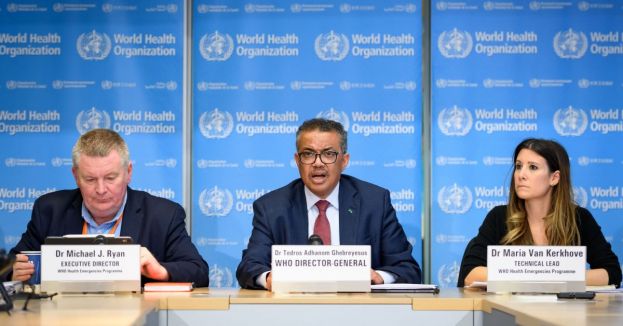The so-called B.1.1.529 variant seems to have a high number of mutations — roughly 30 — in its spike protein, which could affect how easily it spreads to people, scientists have warned.
"We don't know very much about this yet. What we do know is that this variant has a large number of mutations. And the concern is that when you have so many mutations, it can have an impact on how the virus behaves," announced Dr. Maria Van Kerkhove, WHO's the technical lead on COVID-19, according to CNBC.
Here is what we know regarding B.1.1.529 thus far.
It's unclear from where the new variant actually arose, though it was first detected by scientists in South Africa and has further been seen in travelers to Hong Kong and Botswana.
WATCH: SPEAKER JOHNSON CALLS ON COLUMBIA UNIVERSITY PRESIDENT TO RESIGN![]()
On Friday, Israel — one of the world's most vaccinated nations — declared that it has further detected the nation's first case of B.1.1.529 in a traveler who returned from Malawi.
"We are currently on the verge of a state of emergency. Our main principle is to act fast, strong and now," Israeli Prime Minister Naftali Bennett announced in a statement issued by his office.
A CRYING SHAME: PRO-PALESTINIAN PROTESTS FORCE USC TO CANCEL PRIMARY GRADUATION EVENT![]()
The traveler and two other suspected cases have been placed in isolation. Israeli officials explained that all three are vaccinated yet that it is currently looking into their exact vaccination status.
A lot about the strain is still unknown. However, its scientists say its high number of mutations could mean it is more transmissible.
WATCH GREAT ANALYSIS: THE ABSURDITY OF ANTI-ISRAEL PROTESTS![]()
Sharon Peacock, who has led genetic sequencing of COVID-19 in Britain at the University of Cambridge, told the Associated Press that the data so far suggests that the virus' mutations are "consistent with enhanced transmissibility," yet announced that "the significance of many of the mutations is still not known."
REPUBLICAN SENATORS EXPOSE DARK SIDE OF 'FOOD DELIVERY' ECONOMICS![]()
She stated it would take several weeks to do the required lab tests to learn answers.
Francois Balloux, director of the Genetics Institute at University College London, announced a spike in COVID-19 infections in South Africa — particularly in Gauteng, the nation's most populous province — was concerning.
SEE TO BELIEVE: COMING SOON TO A KID'S DRAG SHOW NEAR YOU...(WATCH)![]()
"The biggest risk is that (this variant) is better at re-infecting people as well as being more transmissible and virulent," he announced in a statement.
According to the UK Health Security Agency, B.1.1.529 has a spike protein that is drastically different from the one in the original bug that the vaccines are based on, which is raising some concern about how current jabs will perform against it.
During a briefing Thursday, South Africa's Department of Health further explained that the variant contains several mutations associated with increased antibody resistance, which may reduce the effectiveness of current vaccines.








 Discover alternative ideas that will make you think
Discover alternative ideas that will make you think Engage in mind bending debate
Engage in mind bending debate Earn points, rise in rank, have fun
Earn points, rise in rank, have fun


